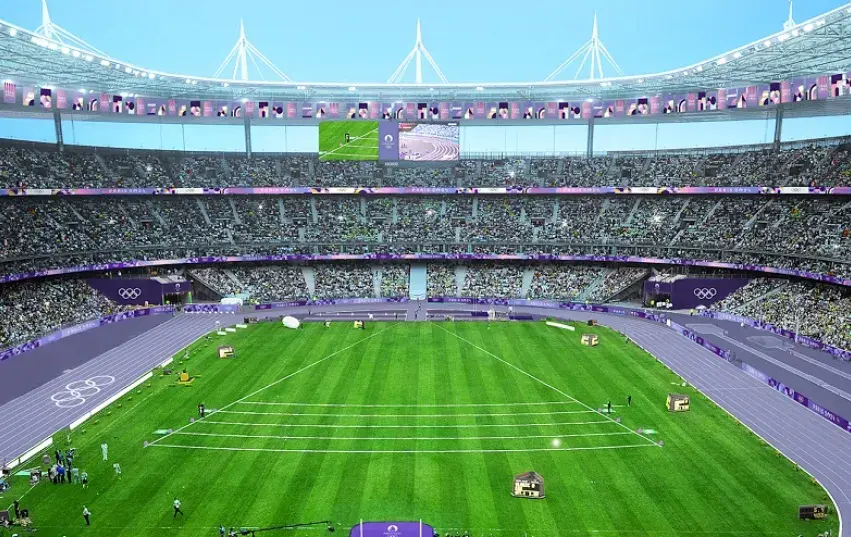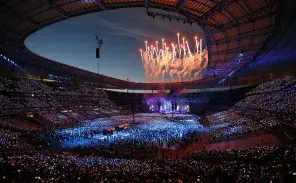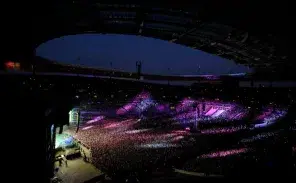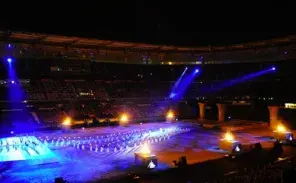The Paris 2024 Olympic and Paralympic Games at the Stade de France

The Paris 2024 Olympic and Paralympic Games at the Stade de France
Begun in August 2021, renovation and modernisation work has enabled the Stade de France to be transformed into an Olympic stadium. As a result, the stadium will be able to host some of the events of the Paris 2024 Olympic and Paralympic Games in the best possible conditions.
The rugby 7s matches will take place from 24 to 30 July, followed by the athletics events from 2 to 10 August and, finally, the closing ceremony on 11 August. Around 2 weeks later, the para-athletes will take over, with the para-athletics events, bringing the Games to a close on 7 September.
On 8 September 2024, Paris will pass the baton to Los Angeles, host city of the 2028 Games, celebrating the athletes and their inspiring performances one last time.
The Stade de France, a venue for major sporting events
On 8 September 2024, Paris will pass the baton to Los Angeles, host city of the 2028 Games, celebrating the athletes and their inspiring performances one last time.
For the Paris 2024 Olympic and Paralympic Games, the Stade de France, the largest stadium in France, will be transformed into an Olympic stadium after hosting the country's biggest sporting events over the last three decades.
Built in Saint-Denis for the 1998 Football World Cup, the Stade de France remains the country's number 1 stadium, hosting major sporting events such as the World Athletics Championships in 2003, the Champions League Finals in 2000, 2006 and 2022, 1 European Rugby Cup, Euro 2016 football and the Rugby World Cup in 2007 and 2023.
Every year, the French football and rugby teams play their matches in the stadium. But that's not all! The stadium also hosts the biggest concerts by French and international stars.
After the Olympic and Paralympic Games, the Stade de France will continue to host the country's biggest sporting and cultural events. It will continue to be the home of France's football and rugby teams, and the recurring venue for the major national finals of these two sports.
Major renovation and modernisation work
In order to host the 2024 Olympic Games in the best possible way, the Stade de France had no choice but to give itself a facelift. The stated aims are to improve the spectator experience, enhance the operational experience for hosting sporting competitions and cultural events, and make the stadium more energy-efficient and environmentally friendly.
Forced to close its doors since the Rugby World Cup Final in October 2023, the Stade de France has reopened to host the Paris 2024 Olympic (26 July to 11 August) and Paralympic (30 August to 7 September) Games, bringing to an end the major works undertaken since 2020.
At the top of the stands, temporary giant screens, the size of tennis courts, have been installed on scaffolding, doubling the available screen area. For the Stade de France, the works in the first half of 2024 represent the final sprint in a long race to adapt the site of the 1998 Football World Cup to the specific requirements of the Olympic Games, awarded to France in 2017.
Work began in 2020, taking advantage of the forced closure caused by the Covid-19 pandemic. Six new public refreshment areas were added, the command post was renovated, and the sports and architectural lighting was modernised. In summer 2021, the two permanent screens, located in the north and south corners, were replaced by new-generation screens, some 50 square metres larger, offering improved technology and definition. Under the roof, white spheres now provide 5G coverage, in addition to the existing 3G-4G. The grandstands have also undergone a thorough cleaning.
The lighting has also been given a facelift and modernised: in detail, the work involved replacing the sodium lamps with more efficient and energy-saving LED lighting, both for the pitch's sports lighting and the architectural lighting, in other words, the building's illumination. In this respect, it is now possible to create truly animated lighting effects, with dynamic projections in a variety of colours, which was not possible with the technology previously used.
The Stade de France has also completely overhauled its power supply. For reasons of power stability, the venue previously relied on diesel-powered generators for its major events. Thanks to the creation of a second power source connected to the grid, it will now operate solely on "city" electricity. The Olympic and Paralympic Games will therefore be "clean" Games.
The most delicate work is taking place in the centre of the stadium, on the "FOP" (Field of Play) in Olympic jargon. The old ochre athletics track was removed to make way for a new 14,000 m² purple track, laid in the spring. This high-precision work required lasers and 3D graders: the surface is to the millimetre to be classified as type 1 by World Athletics (International Athletics Federation). The track has been extended from eight to nine lanes, leaving the inner lane potentially unoccupied, which is considered to be the least favourable for athletes. For reasons of fluidity and television production, the layout of the different areas (pole vault, long jump, triple jump, etc.) has been redesigned in a "Tetris game".
The keys to the Stadium were handed over to the Paris 2024 Organising Committee on 1 June 2024.
Olympic Games events at the Stade de France
Athletics
Athletics was included in the first modern Olympic Games in Athens in 1896. This long history has made it the "king sport" of the Summer Olympics, contributing to its popularity.
The men's programme has remained almost unchanged since the 1932 Games in Los Angeles, with the exception of the 20km walk added in 1956 in Melbourne. Women have been competing in athletics since 1928. The women's programme, which consisted of just 17 events until 1992, is now almost equivalent to that of the men since the addition of the 3,000 m steeplechase in 2008.
At the Tokyo Olympic Games in 2021 (postponed by a year because of the pandemic), Kevin Mayer was the only French medallist, winning silver in the decathlon.
With 48 events, including 43 at the Stade de France, athletics is the individual sport with the most events and the most participants at the Games, thanks to the diversity of its disciplines, ranging from sprinting to middle-distance, including jumps and throws, as well as combined events.
The track programme includes men's and women's sprint, middle-distance and long-distance events, as well as hurdles, steeplechases and relays. All these events take place on the Olympic Stadium track, which is 400 metres long with two straights and two bends.
Two combined events are on the Olympic programme: the women's heptathlon (seven events) and the men's decathlon (ten events). They take place over two days and test the athletes in a series of varied events, crowning the most complete among them.
The competitions take place around the Olympic stadium track. They include jumping events (high jump and pole vault), long jump and triple jump in a sand pit, as well as throws (shot put, discus, hammer) from a circle and the javelin throw on a dedicated track. Athletes compete in turn, with qualifying rounds leading to a final, from 2 to 10 August.
As part of the Paris 2024 Olympic Games, the competition is spread over 9 days, from 2 to 10 August.
Rugby sevens
The history of rugby at the Olympic Games spans several periods. Initially played with fifteen players, rugby made a comeback in 2016 in Rio in its sevens version. From 1900 to 1924, a men's 15-a-side tournament was on the programme, with victories for France, Australasia and the United States.
Since Rio 2016, sevens rugby has made a comeback. At the Tokyo 2021 Games, New Zealand won the women's tournament and Fiji the men's tournament.
In 2024, 24 teams (12 men's and 12 women's) are taking part in the Paris Games, with an intense, fast-paced tournament format over two three-day periods, from 24 to 30 July.
Para athletics
Para athletics began in 1952 with athletes with spinal cord injuries taking part in a javelin throw at the Stoke Mandeville Games.
Incorporated into the Rome Paralympic Games in 1960, Para athletics now includes numerous events in track running (with the exception of obstacle courses and walking), jumping (excluding pole vaulting and triple jump), throwing (including club throwing, but not hammer throwing) and the Paralympic marathon since 1984.
At the Paris 2024 Paralympic Games, there will notably be 29 100m finals due to the different disability categories, making Para athletics the Paralympic sport with the most events (164) and athletes (1069). The competition will run from 30 August to 7 September. This growing popularity is reflected in the ever-increasing number of participants in the Paralympic Games.
The Closing Ceremonies
The Closing Ceremony of the Olympic Games in Paris 2024, on 11 August, will be marked by daring, fraternity and emotion. Athletes from around the world will gather one last time at the Stade de France for a moment of celebration and sharing. On 8 September 2024, Paris will pass the baton to Los Angeles, host city of the 2028 Games, celebrating the athletes and their inspiring performances one last time.
A unique opportunity to leave a positive legacy
In conclusion, the Paris 2024 Olympic and Paralympic Games offer a unique opportunity to leave a positive legacy for the entire Paris region and its residents. Hopes and expectations include improving sports infrastructure, promoting sporting activity, highlighting cultural diversity and raising awareness of environmental issues. The positive economic and social spin-offs are also highly anticipated. It will be interesting to see how these objectives are met and what impact the Games will have on the Paris region in the long term.
The Stade de France, as a key venue for the Paris 2024 Olympic and Paralympic Games, is expected to have significant economic, social and cultural impacts. In economic terms, the event is expected to generate significant revenue from tourism, spectator spending and infrastructure investment. This could stimulate the local economy and create temporary and permanent jobs.
In social terms, the Games could promote social inclusion, diversity and equal opportunities. Sporting events can bring communities together and strengthen the sense of belonging. In addition, the educational programmes and sustainable development initiatives linked to the Games can have a positive long-term impact on society.
Finally, on a cultural level, the Olympic Games provide a platform to showcase local and international culture. By hosting high-level sporting competitions, the Stade de France helps to promote the region's cultural and artistic heritage. These events can also strengthen links between different cultures and encourage intercultural exchange.







